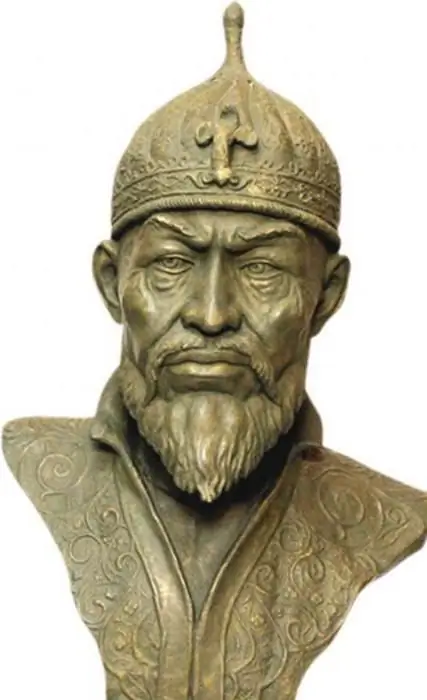- Author Henry Conors [email protected].
- Public 2024-02-12 02:41.
- Last modified 2025-01-23 09:07.
The surname Belousov is not so common in Russia. However, it cannot be included in the rare list. Fans of the Soviet stage will surely remember Yevgeny Belousov, a performer of popular love songs. And history has preserved the names of peasants, merchants and monks who bore this surname. What is its origin? The answer to this question is not as obvious as it might seem at first glance.

Features of the formation of Russian surnames
The names well-known to modern man, such as Mikhail, Alexei, Peter and others, entered the everyday life of a Slav rather late - already in the 13th-15th centuries. In an earlier period, they were "baptismal", personifying the connection with God and providing the patronage of the guardian angel. It was not customary to call them to the first person they met, therefore, in everyday life, other, household names were used, associated with any characteristic feature of a person. It could be a featureappearance, occupation, strange event, etc.
Accordingly, when it became necessary to somehow clarify his belonging to a family, a person called either his profession (blacksmith Ivan, saddler Vasily), or the nickname by which his father or grandfather was known. For example, "Ivashko, Belousov's son." Later, the indication of kinship was dropped, and the nickname of a distant ancestor became a family name.
What does the name Belous mean?
The history and origin of this generic name goes back centuries. The first written mention of this surname dates back to 1495. It was worn by the peasant Ivan, who lives in the Semyonovsky churchyard. A tradesman from Vinnitsa is known, whose name appeared in the annals in 1552, and some others.
The surnames Belous, Belousov, Belousovsky, etc. are widespread not only in Russia, but also in other Slavic countries: Ukraine, Poland, Belarus, Bulgaria. They all consist, obviously, of two roots: “white” and “mustache”. This is typical for Russian "family names" and indicates the origin of the nickname given for any features of a distant ancestor.
The meaning of the name Belousov can be different. The most obvious interpretation is related to the appearance of the ancestor - a man with a white mustache. However, this is not the only possible option.

Existing theories
In order to understand exactly what the name Belousov means, it is not enough to single out two semantic roots. It is necessary to thoroughly study the history of the clan: place of residence, occupation of the ancestor,features of his appearance and character. Even the time of the appearance of the surname plays a role. For example, in the 17th-18th centuries, after the uprising of Bogdan Khmelnytsky and the war with the Commonwe alth, it could have arisen due to the mistake of an official who collects taxes and is obliged to keep household lists of the population. So, "Vasily the Belorussian" could easily turn into "Vasily Belous". Rarely did anyone protest because of such slips of the pen, because the serfs were mostly illiterate, and it was considered honorable for a peasant to have a “family name”.
Thus, the surname Belousov can originate from:
- Ancestral nicknames.
- Wrong spelling of the ethnonym "Belarusian".
- Names of the estate or village where the ancestors lived - for example, Belousovka, etc.
The clue may also lie in the linguistic "nationality" of the name Belousov. The origin of generic names with the ending "ov" is typical for the lands that rallied around Moscow after the Mongol-Tatar invasion. This is a classic version of the Russian surname. But the form "Belous" is more typical for Belarus and Ukraine.
The answer is in hydronymics
There is another little-known version of the origin of the name Belousov. This is the name of one of the tributaries of the Desna - a large river that flows into the Dnieper. After the annexation of left-bank Ukraine by Tsar Alexei Mikhailovich, many immigrants from Little Russia appeared in Russia. Not all of them had a last name. It is likely that someone who once lived on the banks of the Whitebeard was once and for all baptized by neighbors with this nickname.

Two-part name
Most linguists agree that the origin of the name Belousov is associated with the personal nickname of the founder of the family. Unusual appearance was often the reason for assigning a public name to a person. What was the name of a man whose mustache was noticeably lighter than his hair and beard? That's right, Whitebeard. So they could call an early gray-haired person. Moreover, he could not have hair on his head at all - in this case, the mustache became the only noticeable feature of his appearance.
"Vegetable" theory
The main grain crop sown in Russia was rye. It grew on all lands from the White Sea to the Danube, calmly withstood frosts down to -40 ⁰С, long droughts, and heavy rains, which were not uncommon in Eastern Europe. Wheat was sown only in a narrow zone of temperate climate. Some of its varieties, in connection with the characteristic color of the spikelets, were popularly called "white-bearded". She rarely got on the tables of peasants - more often she went for sale or payment of dues. It is not surprising that a person who, for whatever reason, was forced to grow a less important grain crop instead of a rye-nurse, was doomed to bear a “talking” nickname. It is with this that the origin of the name Belousov is connected. Literally, it can be translated as "a descendant of a man who grows whitecats."

There is another plant that could give a nickname to an ancestor. In the Slavic lands, the perennial grass Nardus, or otherwise elous, is well known. It was used by herbaliststo treat fever, swelling of the legs and even altitude sickness. In agriculture, it was not used and was considered a weed. However, it was often planted in wetlands, since the branched root system of this plant strengthens the soil. Accordingly, a person engaged in draining the territory by sowing swamps with this grass could well have received the nickname Belous from fellow villagers.

Differences in the origin of "noble" and peasant surnames
If the generic names of people from the privileged estates are associated with the nickname of the ancestor, then everything is different with the descendants of serfs. The origin of the surname Belousov in this case is more often associated with the possessive case form - that is, with the question "whose". In some villages, several unrelated families still share the same surname. Simply put, Belousov means a peasant belonging to the landowner Belous or Belousov.






